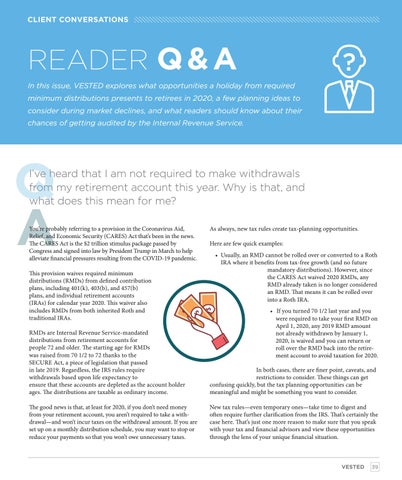READER Q & A
?
In this issue, VESTED explores what opportunities a holiday from required minimum distributions presents to retirees in 2020, a few planning ideas to consider during market declines, and what readers should know about their chances of getting audited by the Internal Revenue Service.
I’ve heard that I am not required to make withdrawals from my retirement account this year. Why is that, and what does this mean for me?
A
You’re probably referring to a provision in the Coronavirus Aid, Relief, and Economic Security (CARES) Act that’s been in the news. The CARES Act is the $2 trillion stimulus package passed by Congress and signed into law by President Trump in March to help alleviate financial pressures resulting from the COVID-19 pandemic. This provision waives required minimum distributions (RMDs) from defined contribution plans, including 401(k), 403(b), and 457(b) plans, and individual retirement accounts (IRAs) for calendar year 2020. This waiver also includes RMDs from both inherited Roth and traditional IRAs.
As always, new tax rules create tax-planning opportunities. Here are few quick examples: • Usually, an RMD cannot be rolled over or converted to a Roth IRA where it benefits from tax-free growth (and no future mandatory distributions). However, since the CARES Act waived 2020 RMDs, any RMD already taken is no longer considered an RMD. That means it can be rolled over into a Roth IRA. • If you turned 70 1/2 last year and you were required to take your first RMD on April 1, 2020, any 2019 RMD amount not already withdrawn by January 1, 2020, is waived and you can return or roll over the RMD back into the retirement account to avoid taxation for 2020.
RMDs are Internal Revenue Service-mandated distributions from retirement accounts for people 72 and older. The starting age for RMDs was raised from 70 1/2 to 72 thanks to the SECURE Act, a piece of legislation that passed in late 2019. Regardless, the IRS rules require withdrawals based upon life expectancy to ensure that these accounts are depleted as the account holder ages. The distributions are taxable as ordinary income.
In both cases, there are finer point, caveats, and restrictions to consider. These things can get confusing quickly, but the tax planning opportunities can be meaningful and might be something you want to consider.
The good news is that, at least for 2020, if you don’t need money from your retirement account, you aren’t required to take a withdrawal—and won’t incur taxes on the withdrawal amount. If you are set up on a monthly distribution schedule, you may want to stop or reduce your payments so that you won’t owe unnecessary taxes.
New tax rules—even temporary ones—take time to digest and often require further clarification from the IRS. That’s certainly the case here. That’s just one more reason to make sure that you speak with your tax and financial advisors and view these opportunities through the lens of your unique financial situation.
39







